Many healthcare providers are encountering operation-related issues. They lack staff to handle the workload, face increasing labor costs, and experience inefficient processes. Meanwhile, patients are expecting timely, personalized, and effective care. This visible challenge has opened a new opportunity for the growth of AI agents in healthcare. They’re not simply advanced technology but digital employees who are capable of completing specific tasks with minimal human oversight. So, is the idea of healthcare AI agents feasible? What can they do to enhance healthcare operations? Are there any notable agents these days? This article will give you a detailed overview of these questions.
What do AI Agents Mean in Healthcare?
Agentic AI has hit the headlines across news reports. Some predict that AI’s next leap isn’t about chatbots. But it’ll revolve around agents that experience the “execution loop” like humans to autonomously think, plan, act, observe (results), reflect, adjust, and repeat. Accordingly, healthcare AI agents are AI-powered assistants that can autonomously perform specific tasks with minimal human intervention. These tasks include:
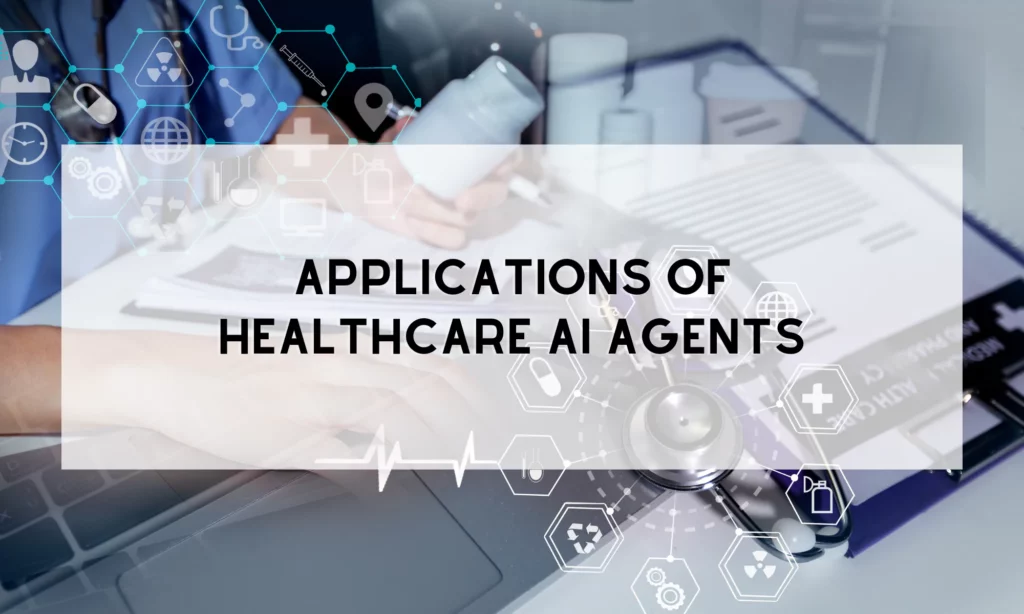
Back Office & Customer-Facing Tasks
AI agents don’t just act within the scope of a single prompt, like extracting data from integrated databases and answering a clinician’s questions. Instead, they can automatically implement back-office and patient-facing tasks thanks to reasoning capabilities. In other words, they’re responsible for handling repetitive tasks, mostly manual data entry, and therefore, leave healthcare professionals more time for strategic initiatives.
For example, Epic, a healthcare software provider, integrated its proprietary AI agent into its EHRs to automate various tasks like care gap closures, clinical documentation, or prior authorizations. Accordingly, the agent sends an automated notification to patients who are behind on their vaccines or immunizations.
Similarly, MUSC Health, based in Charleston, South Carolina, has used AI agents from Notable Health to automatically handle 40% of its insurance approval tasks without human intervention. These agents also handle administrative tasks like processing check-ins or reminding patients of appointments. It also launches Emily, an AI agent powered by SoundHound AI’s Amelia, for patients to manage their appointments and ask non-clinical questions (e.g., about payments or medication refills).
Drug Discovery
Healthcare AI agents are also expected to automate drug discovery. Some research studies introduced and experimented with DrugAgent and PharmAgents, which are both multi-agent frameworks automating drug discovery tasks effectively.
DrugAgent combines an LLM Planner and an LLM Instructor to formulate high-level ideas and implement them using domain knowledge. Meanwhile, PharmAgents can detect potential therapeutic targets and explore promising lead compounds. It also aids in improving how these compounds bind to the targets, as well as enhancing key molecular properties to make the compounds work better as drugs. Besides, it can use computer simulations (in silico) to test whether the compounds are safe or feasible to make.
Top 10 Healthcare AI Agents to Watch
According to the Strata Performance Trends report, patient demands have been rising over time. From outpatient visits and inpatient admissions to observation visits and emergency visits, all increased by at least 5.5%. To meet this growing demand while ensuring operational efficiency, various companies have integrated agentic AI capabilities into their offerings to help healthcare organizations optimize their human resources, reduce operational costs, and enhance patient care. Below are the 10 best healthcare AI agents today:
1. Innovaccer’s Agents of Careᵀᴹ
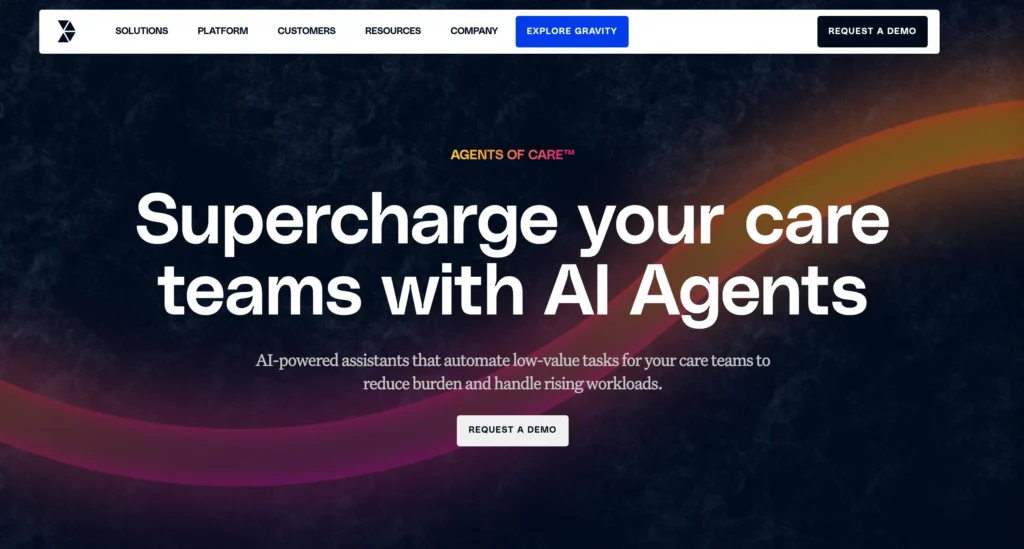
Innovaccer is a healthcare technology company offering software solutions in data activation and analytics. Its core product – the Data Activation Platform – collects healthcare data from disparate sources and converts it into actionable insights. These insights help healthcare providers, payers, and life sciences organizations improve patient outcomes, reduce administrative burden, and maximize revenue performance.
In early 2025, Innovaccer launched Agents of CareTM, a network of pre-trained AI agents that automate low-value, repetitive tasks and take over rising workloads because of staff shortages. These agents seamlessly integrate with 200+ EHRs to access patient information, clinical data, and claims data securely. They also easily adapt to your organization’s workflows and work 24/7. This suite of AI agents includes:
- Scheduling Agent: Automate appointment bookings and rescheduling.
- Patient Intake Agent: Collect important information, validate insurance, and ensure seamless check-ins for patients.
- Referral Agent: Ensure timely appointments with the right specialists while reducing network leakage.
- Authorization Agent: Automate the prior authorization process and forecast approval likelihood.
- ED Follow-up Agent: Automate routine post-discharge check-ins and identify the best time for a care manager to call patients, reducing readmissions.
- Care Gap Closure Agent: Identify and prioritize which patients miss important healthcare actions (e.g., checkups or vaccinations) and need attention most.
2. Hippocratic AI
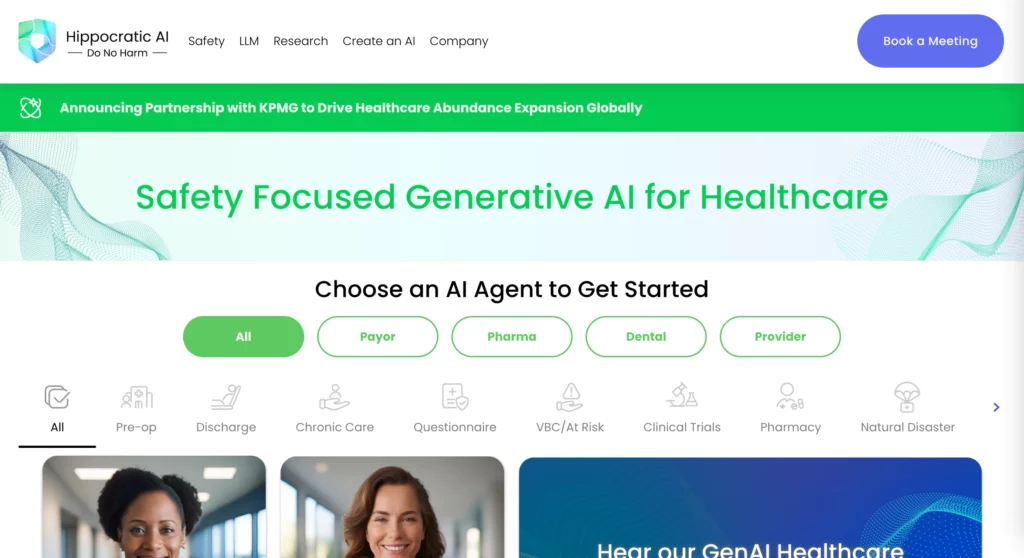
Hippocratic AI develops and deploys a comprehensive suite of AI agents to resolve the growing shortage of healthcare workers worldwide. Its agents are developed to augment healthcare staff in non-diagnostic, patient-facing tasks, like answering patient questions, checking medication adherence, or reviewing patient details before surgery. Some typical AI agents of Hippocratic AI include:
- Lia for biologic infusion follow-up
- Mira for remote patient monitoring
- Ayda for prolia injection appointment prep
- Paloma for post-discharge abdominal pain check-in
- Khadija for diabetes psychosocial screening and education
- Blanca for MRI pre-screening checklist
And many more!
Hippocratic AI has engaged licensed US clinicians to build AI agents through its Healthcare AI Agent App Store. Accordingly, clinicians can create AI agents without the need for coding knowledge. These agents are incorporated with their deep clinical expertise as well as practical insights around specific clinical workflows or patient conditions. This makes these AI agents safer and more effective.
3. Aidoc
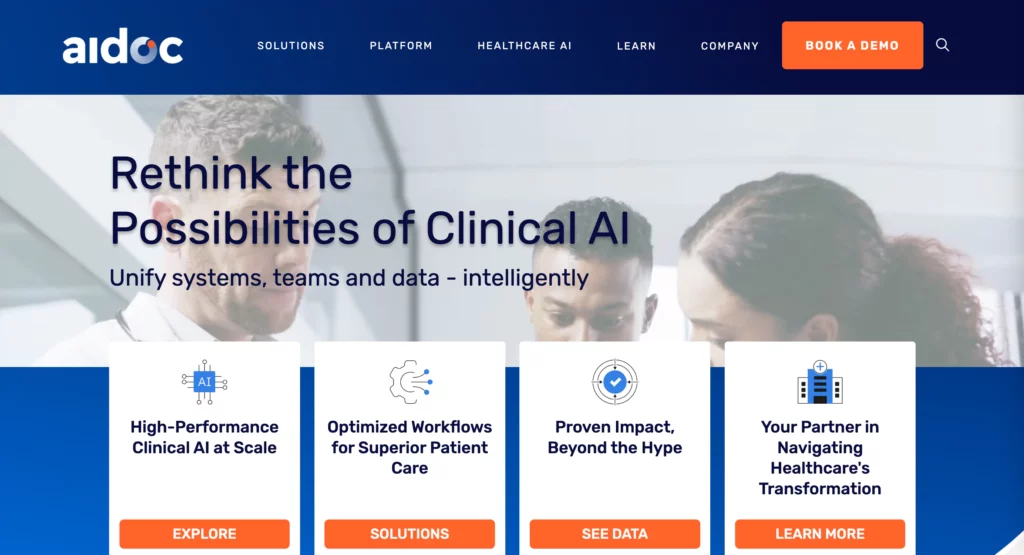
Aidoc offers aiOSTM, a proprietary healthcare platform specializing in medical imaging analysis. The AI-powered platform empowers care teams across departments and specialties to enhance patient treatment and clinical outcomes through its powerful AI solutions. By collecting and analyzing medical data, the platform streamlines workflows in:
- Radiology: Integrates various algorithms like AI triage, detection, or quantification to automate repetitive tasks, increase disease awareness, and prioritize findings.
- Cardiolody: Uses automated CAC (Coronary Artery Calcification) scoring to automatically identify and measure calcium deposits in the coronary arteries from CT scans.
- Vascular: Identifies suspected findings for aortic diseases, pulmonary embolism, deep vein thrombosis, and IVC filters. It then automatically sends real-time alerts for time-sensitive cases and support care team coordination using EHR and mobile imaging tools.
- Neurovascular: Uses high-performing algorithms and care coordination tools to identify patients with stroke, hemorrhage, c-spine fracture, and brain aneurysm through medical imaging analyses. It then automatically routes the findings to care teams, flags all the findings into reports, and populates worklists with actionable insights.
4. Qventus AI Operational Assistants
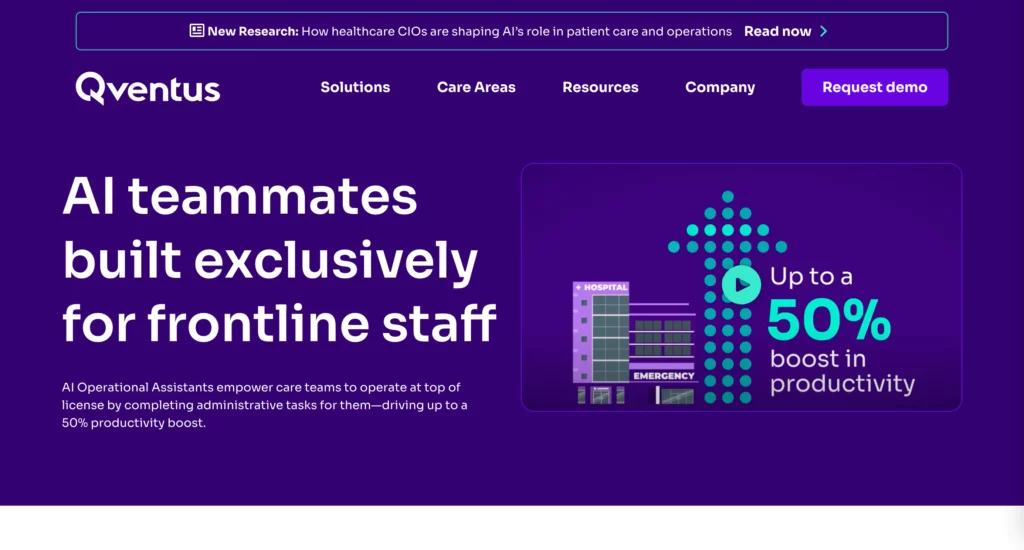
If you’re looking for a powerful AI teammate for hospital operations, don’t ignore Qventus. Integrating deeply with different data sources (e.g., EHR or clinic EMR), the Qventus AI platform uses AI, behavioral science, and more to predict challenges, optimize decisions, and take action on your team’s behalf. Accordingly, the platform is widely adopted for inpatient care, surgical services, and perioperative care coordination.
Qventus offers AI Operational Assistants to handle time-wasting administrative tasks. In particular, they can:
- Communicate with patients on the phone, over email, or via text in different languages.
- Listen to calls and understand notes, faxes, and PDFs to automate data entry and follow-up steps.
- Update EHR data, reschedule surgery, and streamline care team workflows.
- Identify key changes, send follow-up notes, check for errors, and call clinics to collect missing information.
All these capabilities of AI Operational Assistants boost staff productivity up to 50%.
5. Notable
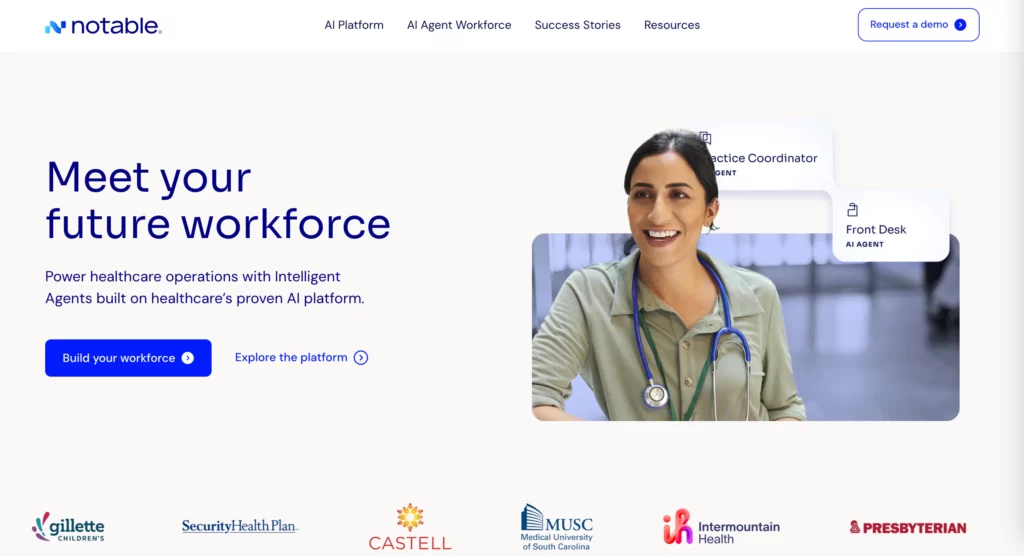
Notable Health offers an AI-powered platform with cutting-edge AI, deep integrations, and ready-made healthcare AI agents to automate common workflows. Further, the platform empowers IT and non-technical teams to build, train, and deploy custom AI agents through the Flow Builder (a drag-and-drop interface).
The Builder features a comprehensive library of pre-built skills and connectors designed specifically for healthcare operations. Whether you want to build AI agents to completely automate low-level tasks or perform high-complexity actions with human review, the Builder can get you covered.
Notable’s virtual team members assist your staff in preparation for patient visits, care quality improvement, transitional care management, and more. You can also track the performance of individual AI agents and overall workflows through real-time analytics and actionable insights.
6. Luminai
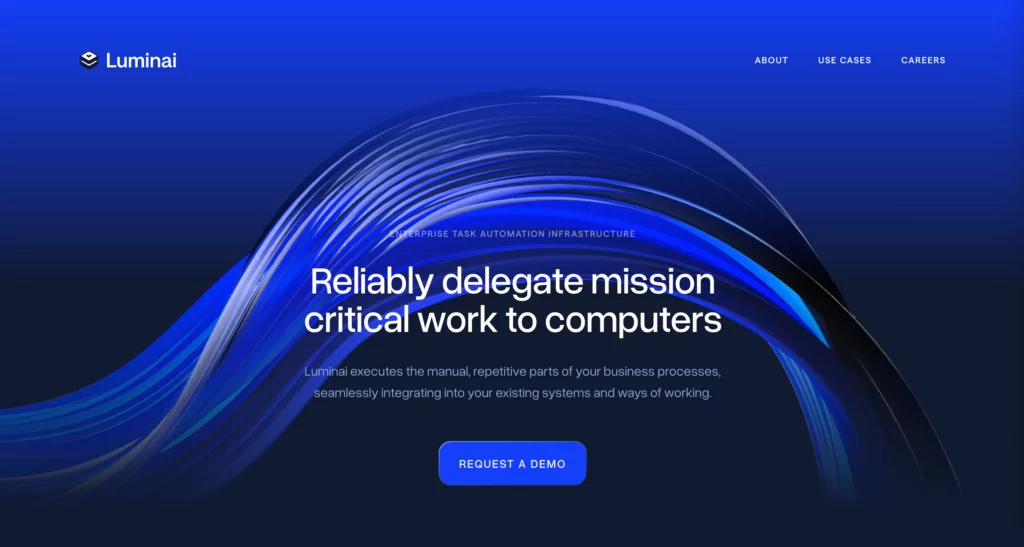
Luminai is an AI-powered platform that automates manual, complex tasks in healthcare (and other industries like finance). Seamlessly integrated with your organization’s existing systems, Luminai allows your team to hand off the following tasks while ensuring operational efficiency:
- Front Office Automation (e.g., front desk registration, scheduling, and benefits verification)
- Mid-Cycle/Clinical Workflow Automation (e.g., provider enrollment & credentialing, care gap management, and clinical documentation review)
- Back Office & Revenue Cycle Automation (e.g., prior authorization, predictive denials & claim edits, and payment posting & contract management)
- Pharmacy & Supply Chain Optimization (e.g., Rx intake & benefit investigation, inventory & PO management, and supply spend analysis)
- Call Center & Patient Engagement (e.g., scheduling & navigation, FAQs & billing queries, and patient collections)
- Health Plan & Payer Workflow Automation (e.g., claims adjudication, utilization management, and risk adjustments).
7. HealthForce AI
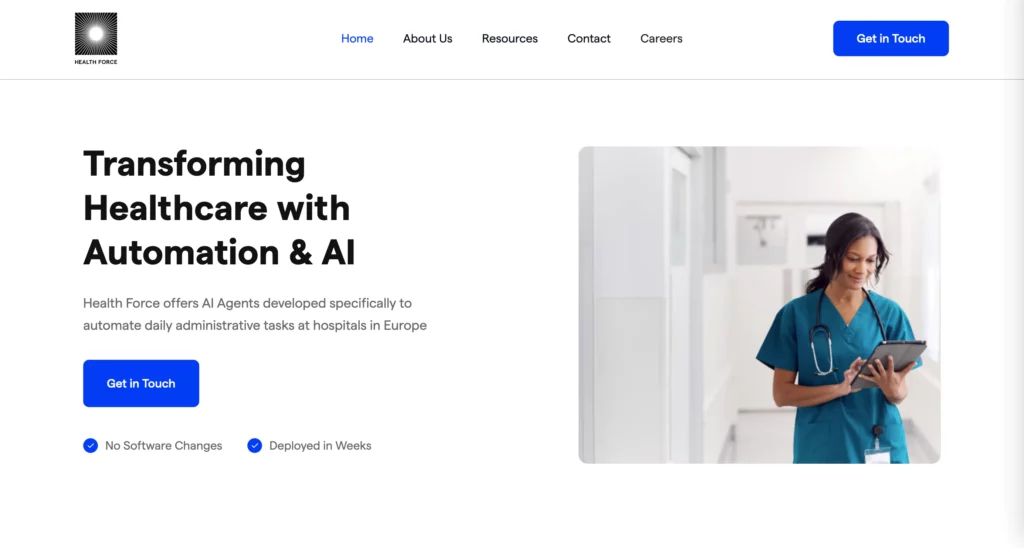
HealthForce AI provides a comprehensive suite of smart agents to streamline hospital operations. These healthcare AI agents not only free up your staff from repetitive tasks but also reduce human errors and operational costs.
Accordingly, they automate back office tasks in healthcare organizations, like scheduling, billing, and procurement. They also improve patient experiences by automatically implementing front desk tasks, like appointment scheduling and insurance verification.
By evaluating your hospital’s readiness and identifying where your facility needs AI agents most, HealthForce AI then configures and integrates the agents into your existing systems. The company also supports analyzing the ROI brought by their AI agents to maximize efficiency and cost savings for your hospital.
8. Eleos Health
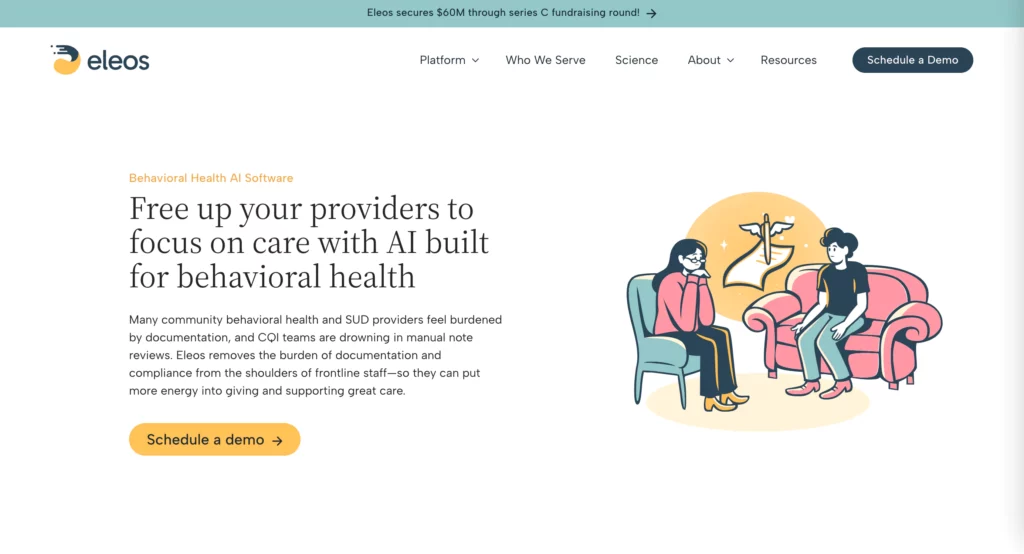
Eleos is a behavioral health AI-powered platform that removes the burden of documentation and manual note reviews from the shoulders of frontline staff. The platform supports more than 100 languages, like Spanish, Mandarin, and French. Whether you find support for community outreach or individual therapy, Eleos’s AI agents can handle them all.
Its AI agent, Eleos Documentation, reduces the time that behavioral health and SUD providers spend on documentation by 70%+. The agent can understand their voice or text inputs and suggest the key, relevant moments to specific sessions or treatments. Eleos also integrates the Session Analytics to help you identify the main themes and patterns in sessions.
Meanwhile, Eleos Compliance helps the providers avoid clawbacks and stay compliant effortlessly. It does so by automatically scanning all your notes to find common compliance problems and giving a score for the quality of the notes. This helps your CQI team catch the quality issues without manually reviewing each note.
9. Infinitus
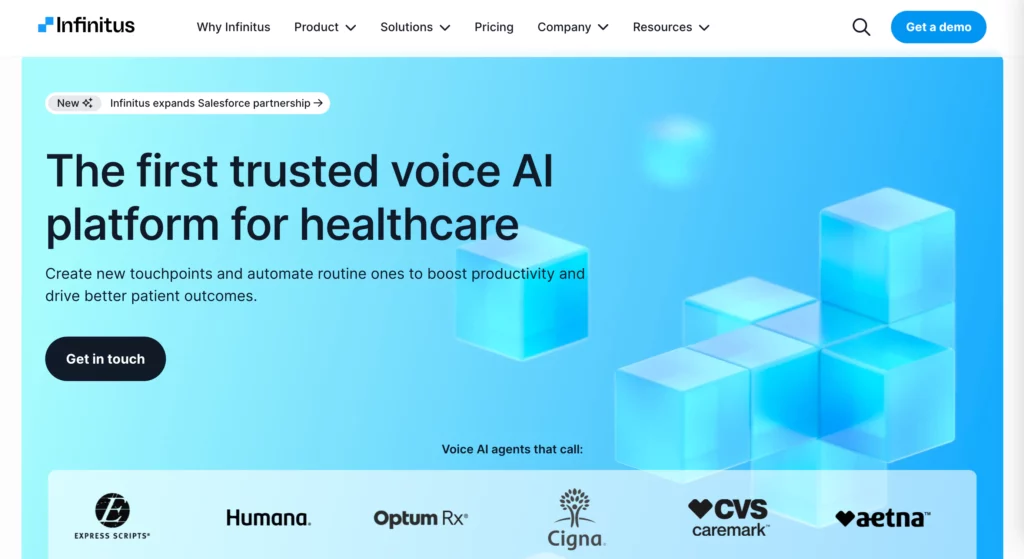
Infinitus is automating phone-based workflows for healthcare workforces to reduce their administrative burden and boost productivity through voice AI. Its AI agents connect patients to the right resources at the right time, as well as gather valuable information for payors and healthcare providers. These voice AI agents include:
- Patient Welcome Call: Answer personalized questions and create a personalized touch for patients who have just started treatment.
- Medication Adherence: Proactively call patients to check whether they’re taking medication as prescribed and how they feel after medicine.
- Health Risk Assessment: Ask necessary questions to assess health risks. This helps the agent identify whether patients get the most out of their insurance plans and whether there are any obstacles to treatment.
Further, Infinitus also offers FastTrackTM, an enterprise AI copilot that automates administrative tasks to improve your team’s performance and skip hold times. Particularly, it enables intelligent call initiation, auto IVR navigation, and more to complete tasks faster, like claim status follow-ups, prior authorizations, and benefit verifications.
10. SoundHound AI’s Amelia
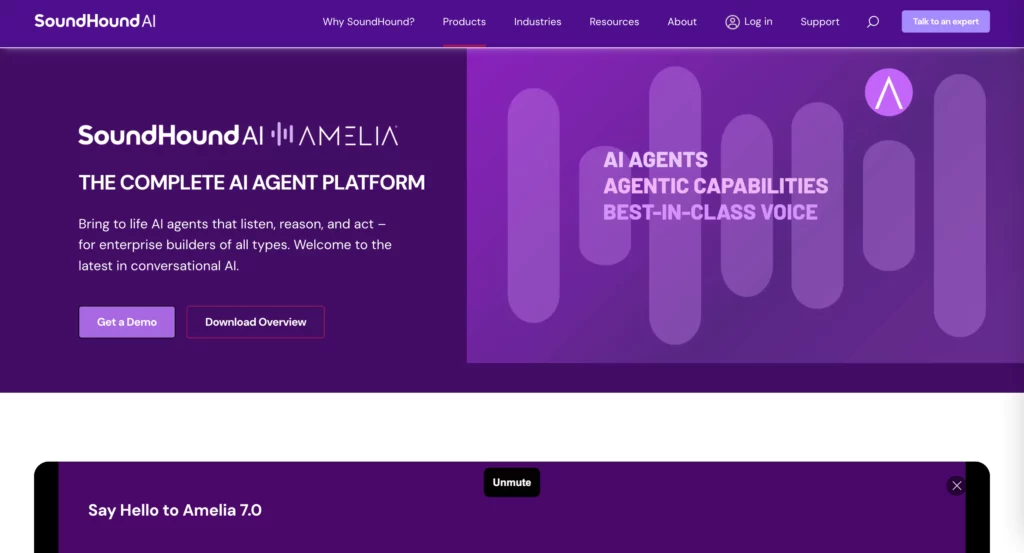
Amelia is one of the leading enterprise AI software companies, yet in 2024, it was acquired by SoundHound AI, a global leader in voice AI.
In mid-2025, SoundHound released the seventh version of Amelia. This upgraded version integrates autonomous AI agents powered by SoundHound AI’s industry-leading speech recognition technology to handle routine tasks on behalf of its customers.
By combining the capabilities of Answer Agents and Action Agents, these AI agents can autonomously take action. For example, they can help patients with digital health services like choosing doctors, scheduling appointments, and managing ongoing care. Besides, they power pharmacies and labs in prescription orders & refills, lab test prep & scheduling, and more.
At the core of each Amelia agent is Agentic+, a proprietary framework for autonomous, multi-agent orchestration. It’s a reasoning engine for Amelia agents to complete tasks with high accuracy.
Aware of Key Challenges
As we mentioned, healthcare AI agents have wide applications in back office and patient-facing tasks, as well as drug discovery. However, they still present several technical limitations you should consider before using. When it comes to healthcare AI agents, we often think of digital assistants thinking, planning, and acting autonomously like humans. But AI agents still have a long way to fully reach that level.
Right now, we see that AI agents excel at analyzing data and can automate workflows to some extent. But real-life healthcare is more complex than what an AI agent can reason, as it’s full of rare cases, context-based decisions, and exceptions. Without deep domain knowledge and long-term practical experience around real-life healthcare situations, human staff have, AI agents hardly handle complex problems.
Besides, healthcare data is siloed and scattered across different systems (e.g., EHRs, lab reports, or insurance records). Not all data is accessible due to its high sensitivity. But without access to complete, contextual data, AI agents can make bad decisions. Further, how we can evaluate the accuracy and reliability of an AI agent’s output is another problem. The big question here is: is there any strict criteria or framework to assess AI agents before use? But unfortunately, many people often ignore it, leading to the wrong use of these agents.
Tyler Maran, CEO at OmniAI, also discovered an interesting fact about agentic AI. The longer conversations and more contextual data AI agents have, the less accurate their outputs are. What does this mean? AI agents still lack the capabilities to handle multi-step processes well.
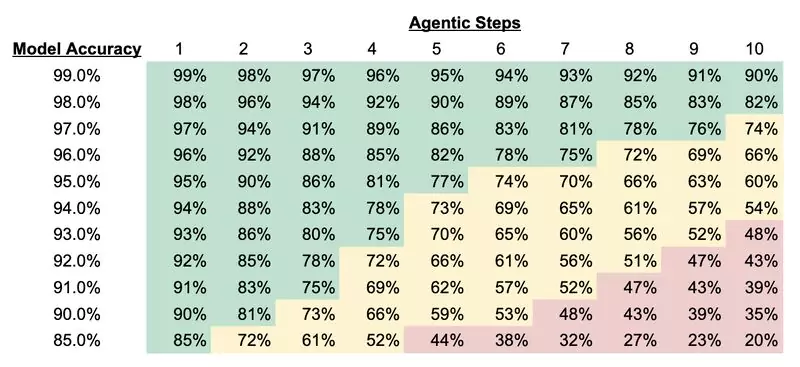
Future of Healthcare AI Agents: Promising or Dull?
When the term “AI agents” or “agentic AI” appears all over the media, we wonder whether it’s just hype or a truly powerful technology. Gartner even predicted that more than 40% of agentic AI will be terminated by the end of 2027, because of unclear business value, increasing costs, and inadequate risk controls.
However, other experts still keep an optimistic attitude towards the growth of AI agents across industries. Especially in healthcare, where there’s a growing demand for automating repetitive tasks and optimizing resources, AI agents are expected to be increasingly adopted. Their global market value, accordingly, will grow at an impressive CAGR of 45.56% from 2025 to 2030.
Aashima Gupta, a global director for healthcare strategy and solutions at Google Cloud, predicted that the next breakthrough for agentic AI is multi-agent systems. Accordingly, AI agents can collaborate autonomously across various functions. And Google introduced the Agent2Agent Protocol, which sets a framework for these agents to communicate seamlessly, even when they’re built by different providers.
So, even when healthcare AI agents are just at the beginning stage, their future is still promising. With technological advances, we believe they can become more intelligent and efficient in automating workflows.
Preparing for the Future with Designveloper’s AI Solutions
AI doesn’t replace human staff, but supports them in addressing administrative and low-level tasks. To receive real benefits from AI agents, you need to consider areas where they can improve your operations and boost employee productivity the most. For example, use AI agents when you need to automate routine tasks, retrieve data quickly, and make informed decisions. But more importantly, your organization should be ready for the use of AI agents.
If you’re ready to integrate AI into your existing workflows, Designveloper is a trusted, experienced partner to work with. We have deep technical expertise in AI development & integration, as well as long-term experience in healthcare technology.
One of our outstanding projects is Sensiotec’s Virtual Medical Assistant®. It measures heart and respiration rate and movement, delivering crucial data to nursing staff’s monitoring devices without the need to physically attach anything to a patient’s body.
Contact us now if you want to discuss your ideas further and receive a free estimation!


